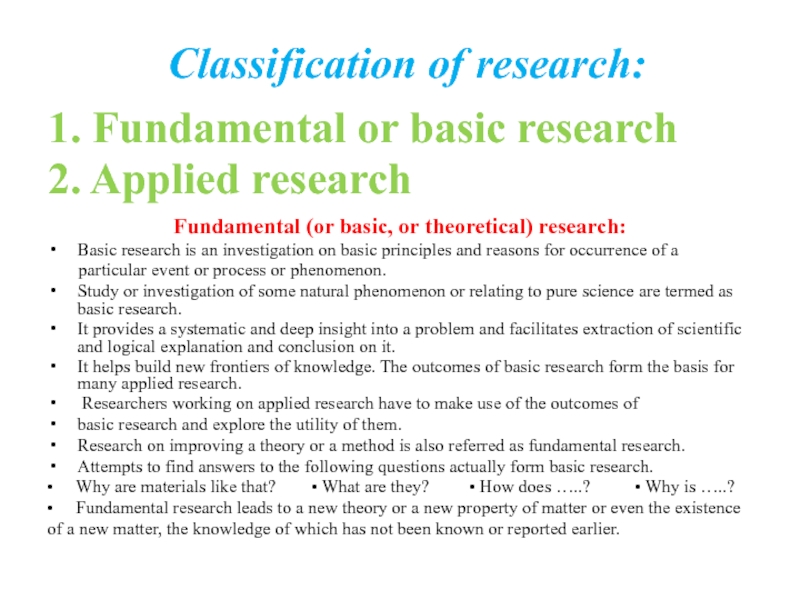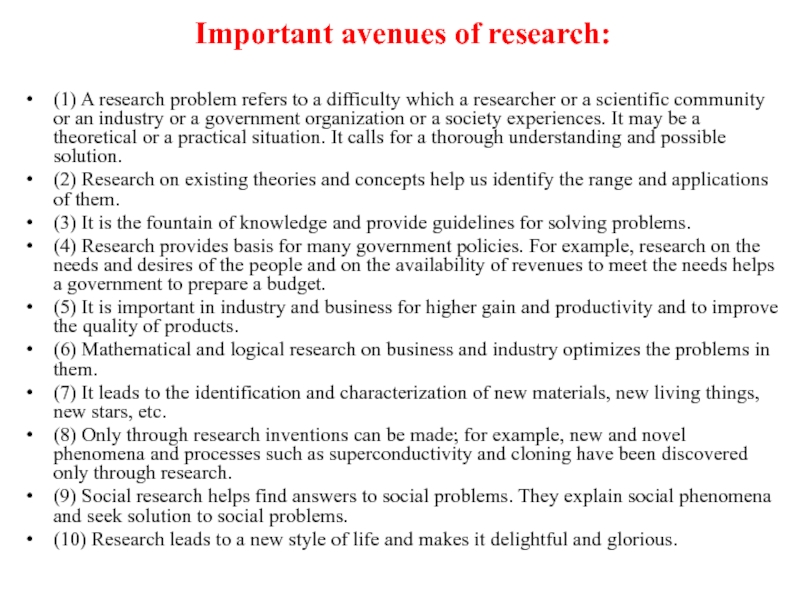Слайд 1
Methodology
of scientific researches
Khamzina B.E.
Doctor of pedagogical sciences,
associate professor
Слайд 2 BASES OF SCIENТIFIC
RESEARCH METHODOLOGY
LECTURE 1
I WHAT IS RESEARCH?
II. RESEARCH
METHODS AND
RESEARCH
METHODOLOGY
LECTURE 2 TYPES OF
RESEARCH
Слайд 5SCIENCE, TECHNOLOGY, ENGINEERING, INNOVATION, SCIENTIFIC THEORY, SCIENTIFIC LAW, HYPOTHESIS, THESIS,
PARADIGM, RESEARCH,
Слайд 43Research is a logical and systematic search for new and
useful information on a particular topic.
It is an investigation
of finding solutions to scientific and social problems through objective and systematic analysis.
It is a search for knowledge, that is, a discovery of hidden truths.
A research can lead to new contributions to the existing knowledge.
Only through research is it possible to make progress in a field.
Research is indeed civilization and determines the economic, social and political development of a nation.
Слайд 44What is the goal of science?
The main goal of science
is to gain knowledge about the world and to apply
it in ways that will better humanity.
Science of challenges: to describe, to predict, control, organization, and explanation facts, processes, phenomena
Слайд 45
Classification of research:
1. Fundamental or basic research
2. Applied research
Fundamental (or
basic, or theoretical) research:
Basic research is an investigation on basic
principles and reasons for occurrence of a
particular event or process or phenomenon.
Study or investigation of some natural phenomenon or relating to pure science are termed as basic research.
It provides a systematic and deep insight into a problem and facilitates extraction of scientific and logical explanation and conclusion on it.
It helps build new frontiers of knowledge. The outcomes of basic research form the basis for many applied research.
Researchers working on applied research have to make use of the outcomes of
basic research and explore the utility of them.
Research on improving a theory or a method is also referred as fundamental research.
Attempts to find answers to the following questions actually form basic research.
• Why are materials like that? • What are they? • How does …..? • Why is …..?
• Fundamental research leads to a new theory or a new property of matter or even the existence
of a new matter, the knowledge of which has not been known or reported earlier.

Слайд 46 Fundamental research on
(1) astronomy may leads to identification of
new planets or stars in our galaxy,
(2) elementary particles results
in identification of new particles,
(3) complex functions may leads to new patterns or new properties associated with them,
(4) differential equations results in new types of solutions or new properties of solutions not known so far,
(5) chemical reactions leads to development of new compounds, new properties of chemicals, mechanism of chemicals reactions, etc.,
(6) medicinal chemistry leads to an understanding of physiological action of various chemicals and drugs,
(7) structure, contents and functioning of various parts of human body helps us identify the basis for certain diseases.
Слайд 48Отрасли наук
Естественные науки:
1Физико-математические науки
2 Химические науки
3Биологические
4 Науки
о Земле и географические науки
Гуманитарные науки
1Исторические науки
2
Филологические науки
3Политические науки
4Философские науки
5Психологические науки
Социальные науки и бизнес, услуги
1Социальные науки и услуги
2Экономика
Образование
1Педагогические науки
2 Психологические науки
Юридические науки
Технические науки и технологии
Сельскохозяйственные и ветеринарные науки
Военное дело и безопасность
Здравоохранение и социальное обеспечение (медицина)
Branches of Science
Natural Sciences:
1 Physics and mathematics
2 Chemical sciences
3 Biological
4 Earth sciences and geographical sciences
Humanitarian sciences
1 Historical sciences
2 Philology
3 Political Science
4 Philosophical sciences
5 Psychological Science
Social sciences and business services
1 Social Sciences and Services
2 Economy
Education
1 Pedagogical sciences
2 Psychological Science
Jurisprudence
Engineering and Technology
Agricultural and veterinary sciences
Military and security
Health and social security (medicine)
Слайд 50
Areas of research:
- science,
- technology,
languages,
literature,
history,
sociology.
Слайд 51What are the methods of research?
Слайд 52Research methods:
study,
experiment,
observation,
analysis,
comparison,
- reasoning.
Слайд 53What are
the Objectives of Research?
Слайд 54 The prime objectives of research:
(1) to discover new facts,
(2)
to verify and test important facts,
(3) to analyze an event
or process or phenomenon to identify the cause and effect relationship,
(4) to develop new scientific tools, concepts and theories to solve and understand scientific,
and nonscientific problems,
(5) to find solutions to scientific, nonscientific and social problems,
(6) to overcome or solve the problems occurring in our every day life.
Слайд 56The motivations of research:
(1) to get a research degree (Master,
Doctor of Philosophy (Ph.D.)) along with its benefits like better
employment, promotion, increment in salary, etc.
(2) to get a research degree and then to get a teaching position in a college or university or become a scientist in a research institution
(3) to get a research position in countries like U.S.A., Canada, Germany, England, Japan, Australia, etc. and settle there
(4) to solve the unsolved and challenging problems
(5) to get joy of doing some creative work
(6) to acquire respectability
(7) to get recognition
(8) curiosity to find out the unknown facts of an event
(9) curiosity to find new things
(10) to serve the society by solving social problems.
Слайд 57Thesis or Ph.D.
Prof.P. Balaram:
Ph.D. degree is a passport
to a research career.
Thesis or Ph.D. research inherently involves
those aspects of subject that cannot
be actually learned from textbooks or from lecture courses.
It is the point where the values, traditions and styles of science are transmitted from one generation to another.
Слайд 58Importance of Research:
Research is important both in scientific and nonscientific
fields.
In our life new problems, events, phenomena and processes
occur every day. Scientists have to undertake research on them and find their causes, solutions, explanations and applications.
Research assists us to understand nature and natural phenomena.
Слайд 59Important avenues of research:
(1) A research problem refers to a
difficulty which a researcher or a scientific community or an
industry or a government organization or a society experiences. It may be a theoretical or a practical situation. It calls for a thorough understanding and possible solution.
(2) Research on existing theories and concepts help us identify the range and applications of them.
(3) It is the fountain of knowledge and provide guidelines for solving problems.
(4) Research provides basis for many government policies. For example, research on the needs and desires of the people and on the availability of revenues to meet the needs helps a government to prepare a budget.
(5) It is important in industry and business for higher gain and productivity and to improve the quality of products.
(6) Mathematical and logical research on business and industry optimizes the problems in them.
(7) It leads to the identification and characterization of new materials, new living things, new stars, etc.
(8) Only through research inventions can be made; for example, new and novel phenomena and processes such as superconductivity and cloning have been discovered only through research.
(9) Social research helps find answers to social problems. They explain social phenomena and seek solution to social problems.
(10) Research leads to a new style of life and makes it delightful and glorious.

Слайд 60 Kinds of basic and applied researches:
Normal and Revolutionary Researches
Normal research
is performed in accordance with a set of rules, concepts and procedures called a paradigm, which is well accepted by the scientists working in that field.
Normal research is something like puzzle-solving: interesting, even beautiful, solutions are found but the rules are remain same.
Revolutionary Research.
In this normal research sometimes unexpected novel results and discoveries are realized which are inconsistent with the existing paradigm.
This is marked by a paradigm shift and a new paradigm emerges under which normal scientific activity can be resumed.
Слайд 61Quantitative and Qualitative Methods
Quantitative research is based on the measurement
of quantity or amount.
Quantitative research is a process which
expressed or described in terms of one or more quantities.
The result of this research is essentially a number or a set of numbers.
The characteristics of quantitative research/method are:
• It is numerical, non-descriptive, applies statistics or mathematics and uses numbers.
• It is an iterative process whereby evidence is evaluated.
• The results are often presented in tables and graphs.
• It is conclusive.
• It investigates the what, where and when of decision making.
Statistics is the most widely used branch of mathematics in quantitative research. It finds applications not only in physical sciences but also in economics, social sciences and biology.
Слайд 62Other Types of Research
action research (fact findings to improve
the quality of
action in the social world),
explanatory research (searching
explanations for events and phenomena, for example finding answer to the question why are the things like what they are?),
exploratory research (getting more information on a topic) and comparative research (obtaining similarities and differences between events, methods, techniques, etc.).
Assignment:
(1) List out at least 10 theoretical and applied methods which you have learned in your UG, PG courses and write their features in two or three sentences.
(2) Write at least 20 questions in your subject the investigation of which forms basic research. Then point out how many of them have already been solved and how many were found in applications.
(3) Distinguish between theory and experiment.
(4) Write a note on importance of theory in basic and applied researches.
(5) Bring out the importance of inter-disciplinary research.
Слайд 64A hypothesis is either suggested explanation for an observable phenomenon, or a reasoned
prediction of a possible causal correlation among multiple phenomena.
A theory is a tested, well-substantiated, unifying explanation for a set of verified, proven factors. A theory is always backed by evidence; a hypothesis is only a suggested possible outcome, and is testable and falsifiable.
Слайд 65Research methodology-
the process used to collect information and data for
the purpose of making business decisions.
The methodology may include
publication research, interviews, surveys and other research techniques, and could include both present and historical information.